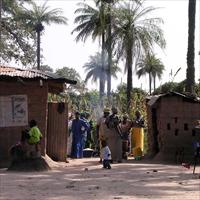SENEGAL: Neither war nor peace in Casamance after 25 years

The assassination of the presidential peace envoy to Senegal’s troubled Casamance region in December will not derail the peace process, government officials say, yet according to observers the peace process is dragging and 25 years after the start of the secessionist rebellion the region remains in a state of neither war no peace.
"In a way it makes sense for the government just to wait until the [secessionist] movement fizzles out," said Vincent Foucher, a researcher at the Centre d'étude d'Afrique noire, Bordeaux.
But he also said such an approach carries risks.
Casamance is no longer gripped by all-out armed conflict yet communities there remain plagued by landmines, violent crime and occasional armed skirmishes, as well as political killings, which appears to be case with the 20 December assassination of the presidential envoy Samsidine Dino Némo Aïdara.
The narrow region is sandwiched between two countries, Guinea-Bissau and Gambia, which remain volatile after years of coups and civil war and which the separatist Movement of Democratic Forces of Casamance (MFDC) has used to its advantage in the past and could do so again, observers said. "[If the regional context were to change it could] allow the MFDC to be empowered again," Foucher said.
Observers say that the MFDC is fragmented and appears weak, but the harder-line faction of Salif Sadio continues to balk at negotiations with the government.
"It does appear that President [Abdoulaye] Wade wishes the MFDC problem would just go away, but it's not going to," Martin Evans, a lecturer in geography at the University of Leicester who closely follows events in Casamance, told IRIN.
"There are significant elements in the MFDC that have not stood down and are not ready to stand down under the terms of the current peace process."
Independence bid
In December 1982 local political and religious leaders in Casamance raised the call of independence for the region. Since then the military wing of the movement has waged a low-level armed struggle that has displaced tens of thousands.
Yet even at the height of the violence in the 1990s the MFDC was not a strong, unified force. "The MFDC has never been good at articulating in politically clear and realistic terms what their goals are,” Evans said.
The group also lacks coordination between its political and military wings, he said. "This is a historical problem and I don't see it changing."
Indeed many key rebel leaders are not likely to attend an MFDC meeting planned for 11 to 13 January, sources in the Casamance capital, Ziguinchor, told IRIN.
Some MFDC members have denounced the assassination of presidential envoy Aïdara. And government officials as well as the victim's brother, Dino Kébanding Aïdara, have said they do not believe that the MFDC was behind the killing. "[The killers are simply] those who do not want peace in Casamance," Kébanding Aïdara said.
President Wade said following the killing “this will not stop us” and “we will continue to move towards peace”.
Yet while the government and most rebel leaders say they want lasting peace in Casamance it remains unclear how peace can take shape, observers say.
"After so long of saying they will be satisfied with nothing short of independence, it is difficult for them to move away from that position," researcher Foucher said. "The minute an MFDC leader says he will settle for something less he has lost much of his power."
The MFDC guerrillas are "stuck", he said. "But they don't simply want out. They want something for themselves -- something meaningful."
He added, "It is not even clear what the government could possibly give that would satisfy a tough customer like [MFDC faction leader Salif] Sadio."
- UGANDA: Population out of step with peace talks - report
- UGANDA: LRA sticks to its guns, yet ready to sign peace deal
- UGANDA: Rebel leaders visit expected to boost peace process
- COTE D'IVOIRE: No war, no peace five years after rebellion
- Top ten most underreported humanitarian stories of 2007 - Civilians caught between armed groups in Central African Republic
 Back and Next - Back and Next
Back and Next - Back and Next See Also - See Also
See Also - See Also